Abstract
OBJECTIVE--To examine prospectively the association between dietary intake of vitamins C and E, carotene, and riboflavin and cataract extraction in women. DESIGN--Prospective cohort study beginning in 1980 with eight years of follow up. SETTING--11 states of the United States. PARTICIPANTS--Female registered nurses who were 45 to 67 years of age. 50,828 women were included in 1980 and others were added as they became 45 years of age. MAIN OUTCOME MEASURE--Incidence of extraction of senile cataracts. RESULTS--493 cataracts were extracted during 470,302 person years of follow up. Intake of carotene and vitamin A was inversely associated with cataract: in multivariate analyses, women in the highest fifth of total vitamin A intake (excluding supplements) had a 39% lower risk of cataract relative to women in the lowest fifth (relative risk 0.61; 95% confidence interval 0.45 to 0.81). Neither riboflavin nor dietary vitamins E or C were associated with cataract in a multivariate analysis. Among specific food items spinach (rather than carrots, the greatest source of beta carotene) was most consistently associated with a lower relative risk. The risk of cataract was 45% lower among women who used vitamin C supplements for 10 or more years(relative risk 0.55 (0.32 to 0.96)), but no association was noted for multivitamin intake. CONCLUSION--Dietary carotenoids, although not necessarily beta carotene, and long term vitamin C supplementation may decrease the risk of cataracts severe enough to require extraction.
Full text
PDF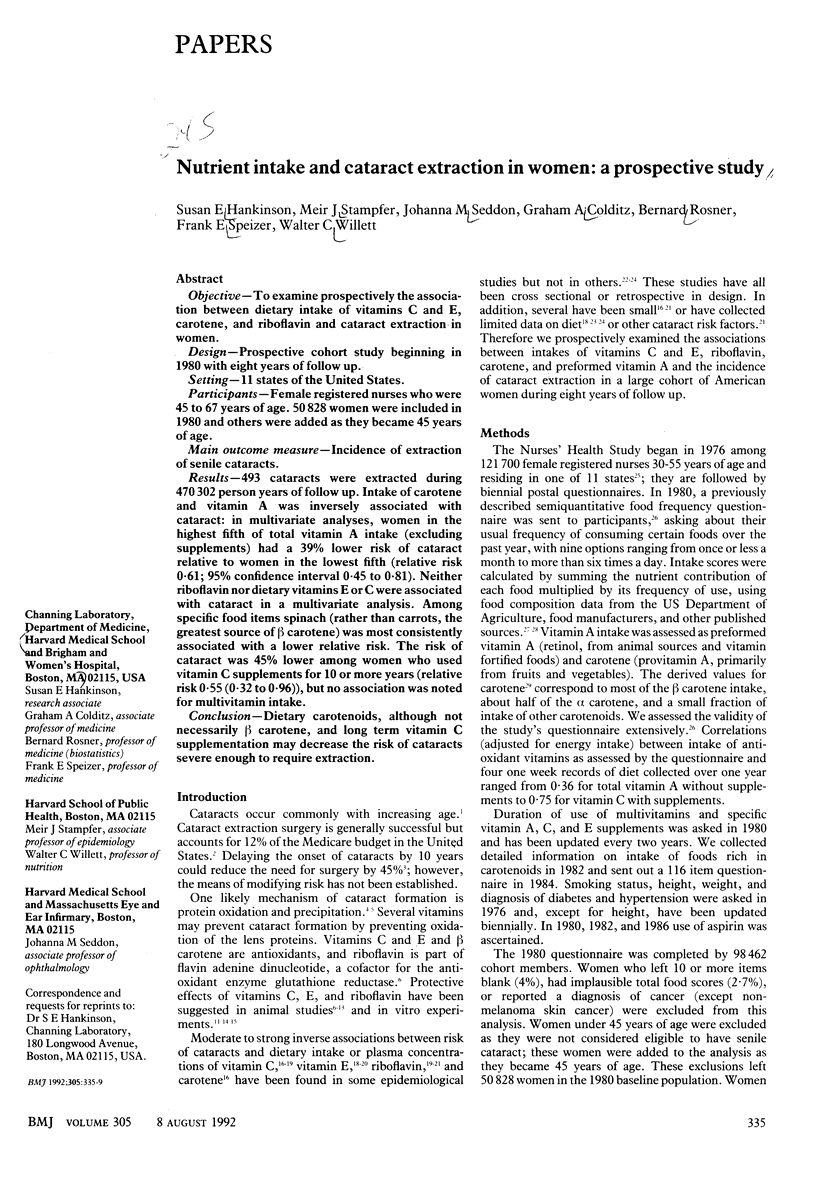
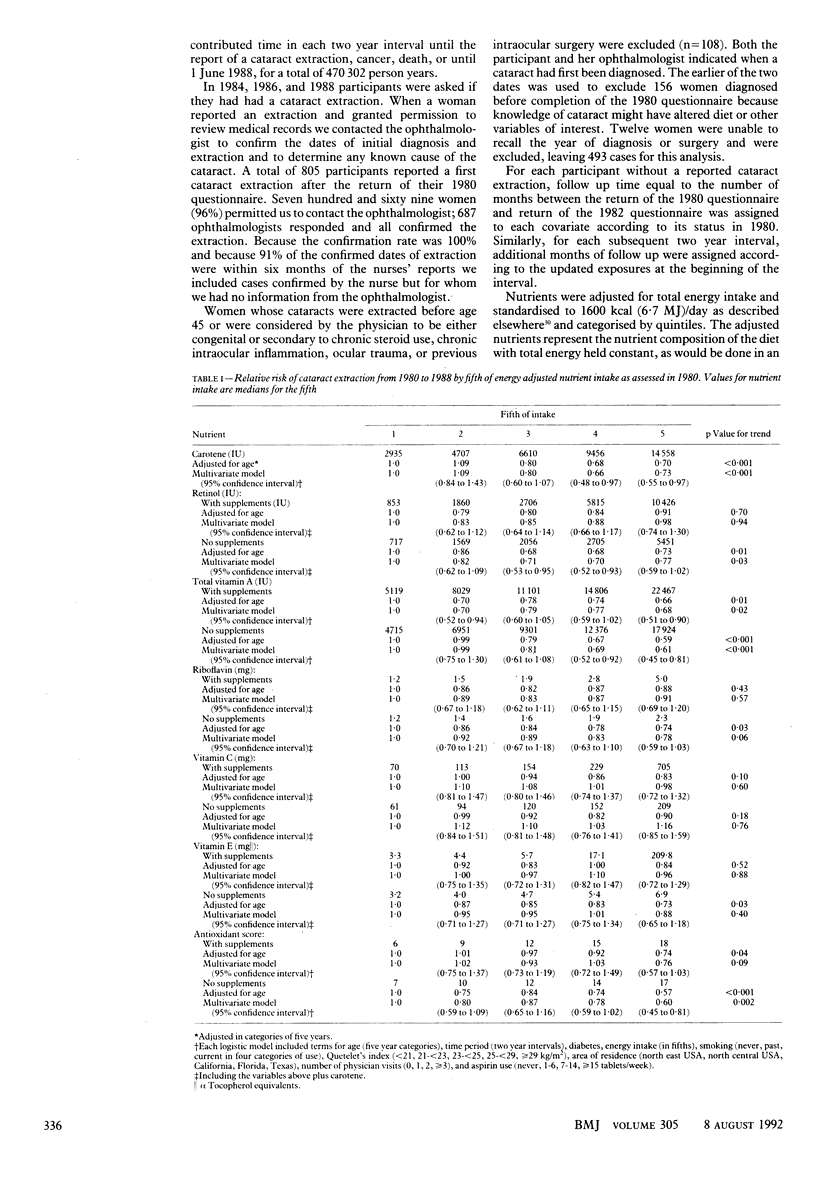
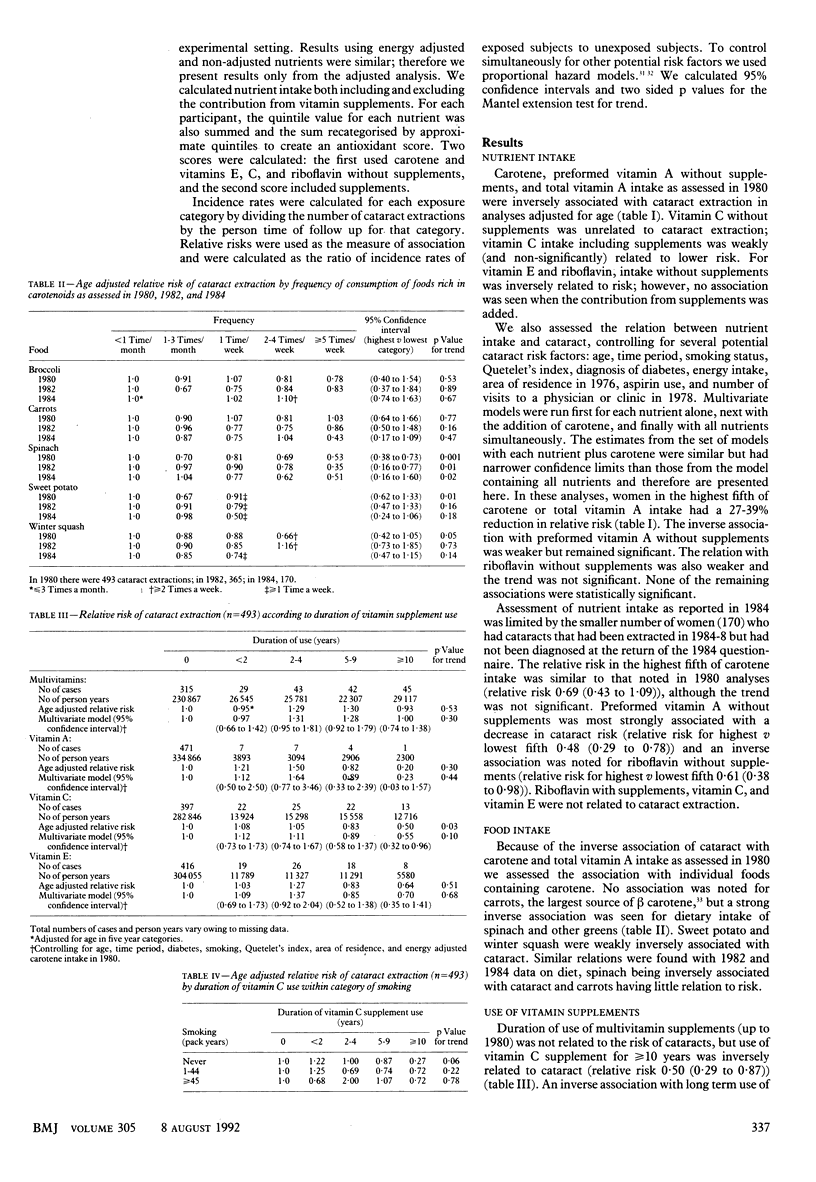
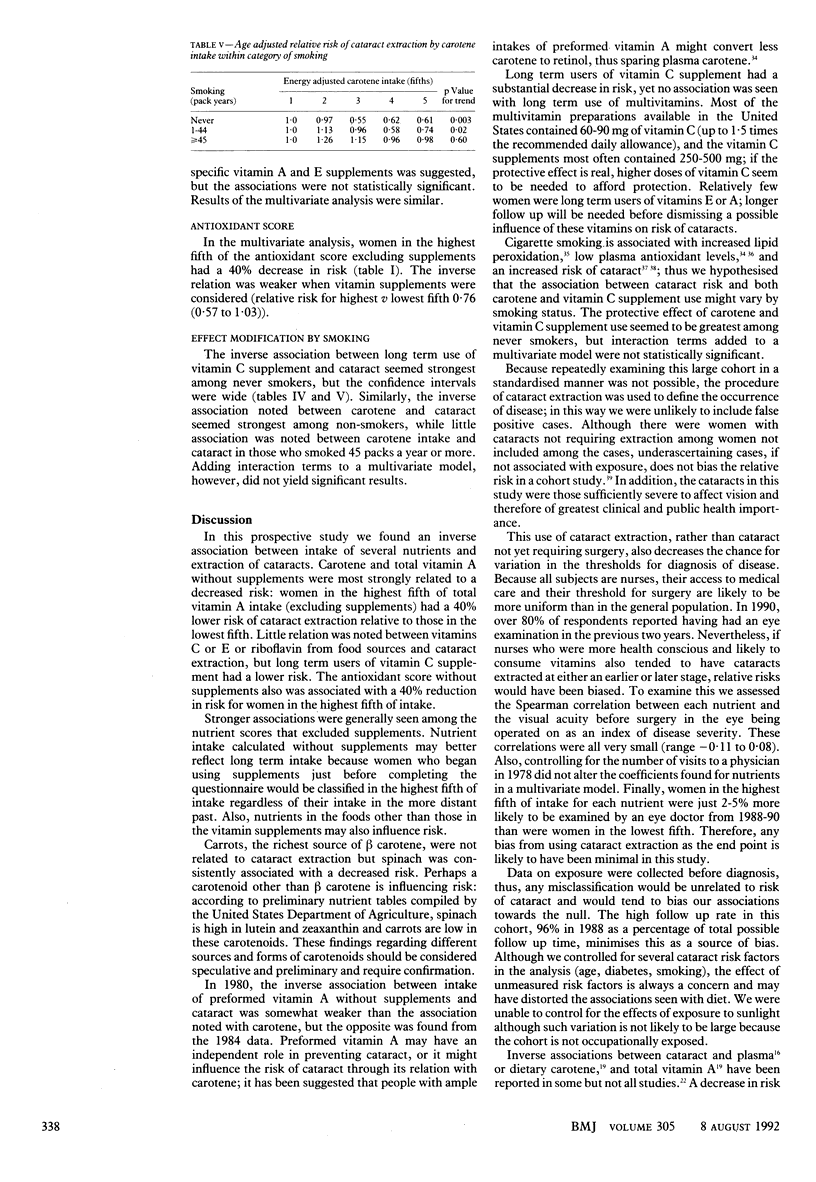
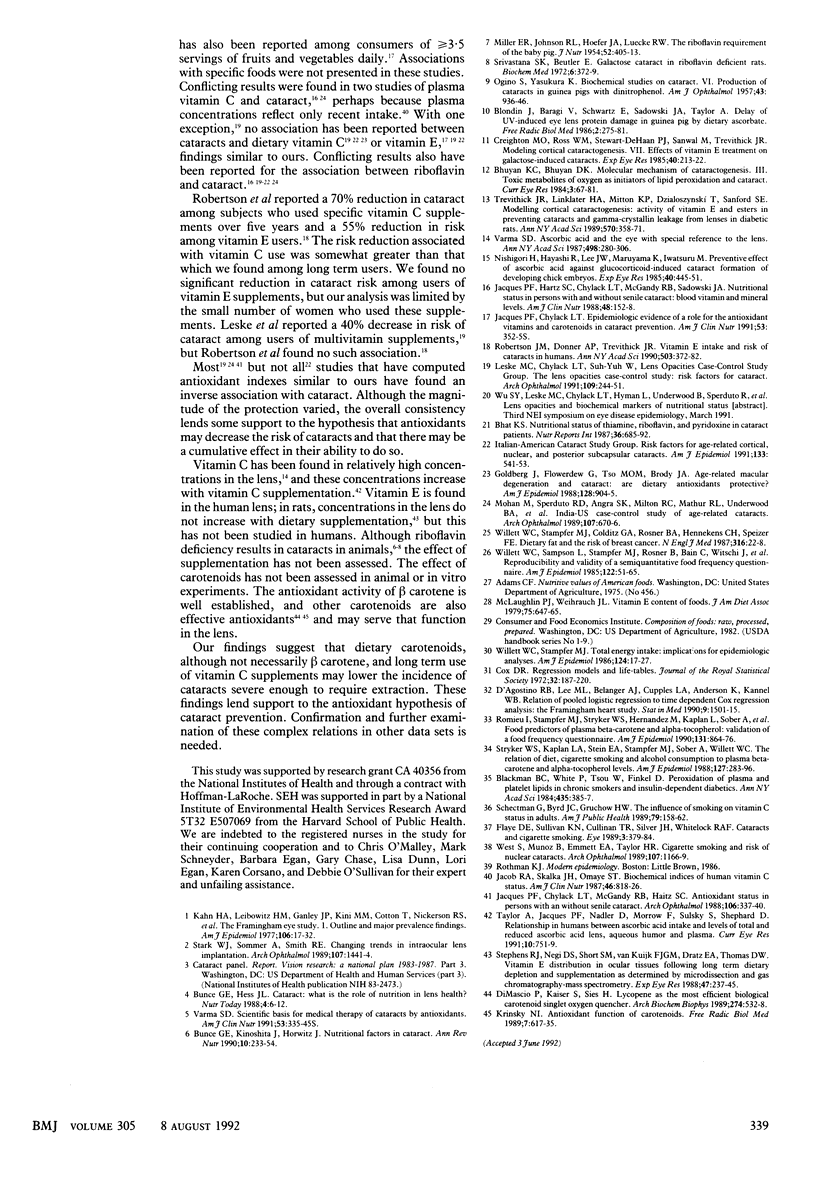
Selected References
These references are in PubMed. This may not be the complete list of references from this article.
- Bhuyan K. C., Bhuyan D. K. Molecular mechanism of cataractogenesis: III. Toxic metabolites of oxygen as initiators of lipid peroxidation and cataract. Curr Eye Res. 1984 Jan;3(1):67–81. doi: 10.3109/02713688408997188. [DOI] [PubMed] [Google Scholar]
- Blondin J., Baragi V., Schwartz E., Sadowski J. A., Taylor A. Delay of UV-induced eye lens protein damage in guinea pigs by dietary ascorbate. J Free Radic Biol Med. 1986;2(4):275–281. doi: 10.1016/s0748-5514(86)80010-1. [DOI] [PubMed] [Google Scholar]
- Bunce G. E., Kinoshita J., Horwitz J. Nutritional factors in cataract. Annu Rev Nutr. 1990;10:233–254. doi: 10.1146/annurev.nu.10.070190.001313. [DOI] [PubMed] [Google Scholar]
- Creighton M. O., Ross W. M., Stewart-DeHaan P. J., Sanwal M., Trevithick J. R. Modelling cortical cataractogenesis VII: Effects of vitamin E treatment on galactose-induced cataracts. Exp Eye Res. 1985 Feb;40(2):213–222. doi: 10.1016/0014-4835(85)90006-5. [DOI] [PubMed] [Google Scholar]
- D'Agostino R. B., Lee M. L., Belanger A. J., Cupples L. A., Anderson K., Kannel W. B. Relation of pooled logistic regression to time dependent Cox regression analysis: the Framingham Heart Study. Stat Med. 1990 Dec;9(12):1501–1515. doi: 10.1002/sim.4780091214. [DOI] [PubMed] [Google Scholar]
- Di Mascio P., Kaiser S., Sies H. Lycopene as the most efficient biological carotenoid singlet oxygen quencher. Arch Biochem Biophys. 1989 Nov 1;274(2):532–538. doi: 10.1016/0003-9861(89)90467-0. [DOI] [PubMed] [Google Scholar]
- Flaye D. E., Sullivan K. N., Cullinan T. R., Silver J. H., Whitelocke R. A. Cataracts and cigarette smoking. The City Eye Study. Eye (Lond) 1989;3(Pt 4):379–384. doi: 10.1038/eye.1989.56. [DOI] [PubMed] [Google Scholar]
- Jacob R. A., Skala J. H., Omaye S. T. Biochemical indices of human vitamin C status. Am J Clin Nutr. 1987 Nov;46(5):818–826. doi: 10.1093/ajcn/46.5.818. [DOI] [PubMed] [Google Scholar]
- Jacques P. F., Chylack L. T., Jr, McGandy R. B., Hartz S. C. Antioxidant status in persons with and without senile cataract. Arch Ophthalmol. 1988 Mar;106(3):337–340. doi: 10.1001/archopht.1988.01060130363022. [DOI] [PubMed] [Google Scholar]
- Jacques P. F., Hartz S. C., Chylack L. T., Jr, McGandy R. B., Sadowski J. A. Nutritional status in persons with and without senile cataract: blood vitamin and mineral levels. Am J Clin Nutr. 1988 Jul;48(1):152–158. doi: 10.1093/ajcn/48.1.152. [DOI] [PubMed] [Google Scholar]
- Kahn H. A., Leibowitz H. M., Ganley J. P., Kini M. M., Colton T., Nickerson R. S., Dawber T. R. The Framingham Eye Study. I. Outline and major prevalence findings. Am J Epidemiol. 1977 Jul;106(1):17–32. doi: 10.1093/oxfordjournals.aje.a112428. [DOI] [PubMed] [Google Scholar]
- Krinsky N. I. Antioxidant functions of carotenoids. Free Radic Biol Med. 1989;7(6):617–635. doi: 10.1016/0891-5849(89)90143-3. [DOI] [PubMed] [Google Scholar]
- Leske M. C., Chylack L. T., Jr, Wu S. Y. The Lens Opacities Case-Control Study. Risk factors for cataract. Arch Ophthalmol. 1991 Feb;109(2):244–251. doi: 10.1001/archopht.1991.01080020090051. [DOI] [PubMed] [Google Scholar]
- MILLER E. R., JOHNSTON R. L., HOEFER J. A., LUECKE R. W. The riboflavin requirement of the baby pig. J Nutr. 1954 Mar;52(3):405–413. doi: 10.1093/jn/52.3.405. [DOI] [PubMed] [Google Scholar]
- McLaughlin P. J., Weihrauch J. L. Vitamin E content of foods. J Am Diet Assoc. 1979 Dec;75(6):647–665. [PubMed] [Google Scholar]
- Mohan M., Sperduto R. D., Angra S. K., Milton R. C., Mathur R. L., Underwood B. A., Jaffery N., Pandya C. B., Chhabra V. K., Vajpayee R. B. India-US case-control study of age-related cataracts. India-US Case-Control Study Group. Arch Ophthalmol. 1989 May;107(5):670–676. doi: 10.1001/archopht.1989.01070010688028. [DOI] [PubMed] [Google Scholar]
- Nishigori H., Hayashi R., Lee J. W., Maruyama K., Iwatsuru M. Preventive effect of ascorbic acid against glucocorticoid-induced cataract formation of developing chick embryos. Exp Eye Res. 1985 Mar;40(3):445–451. doi: 10.1016/0014-4835(85)90157-5. [DOI] [PubMed] [Google Scholar]
- OGINO S., YASUKURA K. Biochemical studies on cataract. VI. Production of cataracts in guinea pigs with dinitrophenol. Am J Ophthalmol. 1957 Jun;43(6):936–946. [PubMed] [Google Scholar]
- Romieu I., Stampfer M. J., Stryker W. S., Hernandez M., Kaplan L., Sober A., Rosner B., Willett W. C. Food predictors of plasma beta-carotene and alpha-tocopherol: validation of a food frequency questionnaire. Am J Epidemiol. 1990 May;131(5):864–876. doi: 10.1093/oxfordjournals.aje.a115577. [DOI] [PubMed] [Google Scholar]
- Schectman G., Byrd J. C., Gruchow H. W. The influence of smoking on vitamin C status in adults. Am J Public Health. 1989 Feb;79(2):158–162. doi: 10.2105/ajph.79.2.158. [DOI] [PMC free article] [PubMed] [Google Scholar]
- Srivastava S. K., Beutler E. Galactose cataract in riboflavin deficient rats. Biochem Med. 1972 Aug;6(4):372–379. doi: 10.1016/0006-2944(72)90023-3. [DOI] [PubMed] [Google Scholar]
- Stark W. J., Sommer A., Smith R. E. Changing trends in intraocular lens implantation. Arch Ophthalmol. 1989 Oct;107(10):1441–1444. doi: 10.1001/archopht.1989.01070020515030. [DOI] [PubMed] [Google Scholar]
- Stephens R. J., Negi D. S., Short S. M., van Kuijk F. J., Dratz E. A., Thomas D. W. Vitamin E distribution in ocular tissues following long-term dietary depletion and supplementation as determined by microdissection and gas chromatography-mass spectrometry. Exp Eye Res. 1988 Aug;47(2):237–245. doi: 10.1016/0014-4835(88)90007-3. [DOI] [PubMed] [Google Scholar]
- Stryker W. S., Kaplan L. A., Stein E. A., Stampfer M. J., Sober A., Willett W. C. The relation of diet, cigarette smoking, and alcohol consumption to plasma beta-carotene and alpha-tocopherol levels. Am J Epidemiol. 1988 Feb;127(2):283–296. doi: 10.1093/oxfordjournals.aje.a114804. [DOI] [PubMed] [Google Scholar]
- Trevithick J. R., Linklater H. A., Mitton K. P., Dzialoszynski T., Sanford S. E. Modeling cortical cataractogenesis: IX. Activity of vitamin E and esters in preventing cataracts and gamma-crystallin leakage from lenses in diabetic rats. Ann N Y Acad Sci. 1989;570:358–371. doi: 10.1111/j.1749-6632.1989.tb14935.x. [DOI] [PubMed] [Google Scholar]
- Varma S. D. Ascorbic acid and the eye with special reference to the lens. Ann N Y Acad Sci. 1987;498:280–306. doi: 10.1111/j.1749-6632.1987.tb23768.x. [DOI] [PubMed] [Google Scholar]
- West S., Munoz B., Emmett E. A., Taylor H. R. Cigarette smoking and risk of nuclear cataracts. Arch Ophthalmol. 1989 Aug;107(8):1166–1169. doi: 10.1001/archopht.1989.01070020232031. [DOI] [PubMed] [Google Scholar]
- Willett W. C., Sampson L., Stampfer M. J., Rosner B., Bain C., Witschi J., Hennekens C. H., Speizer F. E. Reproducibility and validity of a semiquantitative food frequency questionnaire. Am J Epidemiol. 1985 Jul;122(1):51–65. doi: 10.1093/oxfordjournals.aje.a114086. [DOI] [PubMed] [Google Scholar]
- Willett W. C., Stampfer M. J., Colditz G. A., Rosner B. A., Hennekens C. H., Speizer F. E. Dietary fat and the risk of breast cancer. N Engl J Med. 1987 Jan 1;316(1):22–28. doi: 10.1056/NEJM198701013160105. [DOI] [PubMed] [Google Scholar]
- Willett W., Stampfer M. J. Total energy intake: implications for epidemiologic analyses. Am J Epidemiol. 1986 Jul;124(1):17–27. doi: 10.1093/oxfordjournals.aje.a114366. [DOI] [PubMed] [Google Scholar]


